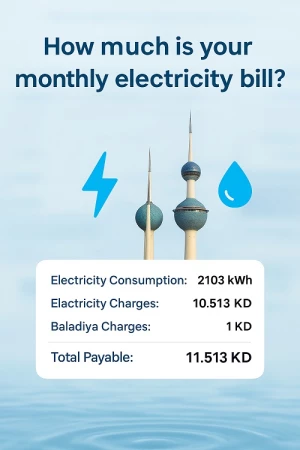Latest News
- Expats Alert: PACI Just Changed The Rules For Updating Your Addr...
- Best Pizza In Kuwait: Top Brands And What To Order
- Best Budget-Friendly Chalets & Villas In Kuwait For Weekend Geta...
- Why Electricity Bills Are Rising In Kuwait & Smart Ways Expats C...
- App Store Optimization: Why It’s Becoming A Core Part Of SEO Str...
- Best Shower Filters In Kuwait For Hair Fall And Skin Protection
- Exness Sets A New Standard Of Consistency In The Trading Industr...
- Instant Withdrawals In Trading – A Game Changer For Traders In K...
- Best Abaya Shop In Kuwait: Editorial Review Of Abay.com
- IPhone 17 In Kuwait: Prices, Colors, Specs & Where To Buy
- Best Drinking Water Filter For Home In Kuwait
- Avoid Common Qatar E-visa Application Mistakes. Learn The Top 5...
New Work Hours Suggested To Reduce Peak Electricity Demand
To address the rising electricity demand during Kuwait’s hot summer months, the Ministry of Electricity has submitted a proposal to the Civil Service Commission recommending adjustments to government working hours aimed at reducing electricity consumption during peak periods.
Proposed Changes to Government Working Hours
According to informed sources, the Ministry has suggested delaying the start of evening shifts in government agencies to avoid overlapping with the peak electricity consumption hours, which typically occur between 12:00 p.m. and 5:00 p.m. Moreover, the Ministry has recommended suspending the flexible work schedule during the summer months to help decrease the energy load on public sector facilities.
Additional Measures Under Review
Besides these proposals, the Ministry is also reviewing other potential measures that require approval from the Cabinet. One significant idea under consideration is to conclude the school year for all educational levels immediately after the final results are announced. This step could substantially reduce electricity use during peak afternoon hours, further easing the burden on the national power grid.
Benefits of the Proposed Measures
The sources highlighted that the proposed changes aim to alleviate pressure on the electricity infrastructure without causing significant disruptions to other sectors. For example, adjusting work shifts is expected to have minimal impact on traffic patterns, which are primarily affected by the school calendar.
Standardizing start and end times in government offices will help prevent unnecessary energy consumption. As one source explained, “It is not reasonable for air conditioning and lighting systems to operate for extended hours when only a limited number of employees are present in the building.”
Supporting Kuwait’s Energy Efficiency Strategy
If adopted, these measures will contribute to a comprehensive national strategy focused on enhancing energy efficiency during Kuwait’s high-demand summer season. This aligns with Kuwait’s ongoing efforts to manage energy resources effectively and promote sustainable practices.





